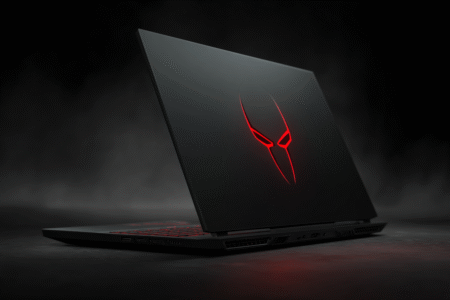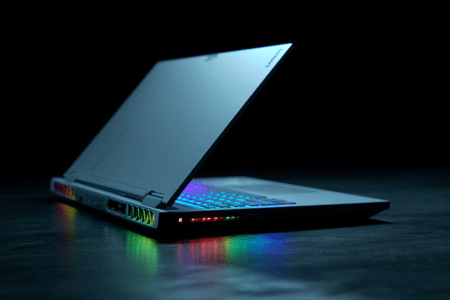So, you’re standing at a crossroads, wallet in hand, with a monumental question echoing in your mind: Are gaming laptops worth it? Let me tell you, I’ve been there. For years, I was a die-hard desktop guy. I loved the ritual of picking out every component, the satisfaction of piecing it all together, and the raw, unadulterated power of a full-sized tower humming under my desk. The very idea of gaming on a laptop felt like a compromise. But then, life happens. You travel more, your living space changes, and suddenly, that massive desktop starts to feel more like an anchor than an advantage.
The answer to this big question isn’t a simple yes or no. Honestly, it’s one of the most classic “it depends” scenarios in the tech world. It’s a tug-of-war between the undeniable freedom of portability and the sheer power and value of a stationary desktop. This article isn’t here to give you a one-size-fits-all answer. Instead, I’m going to walk you through my own thought process and break down every angle of this debate. We’ll look at the cost, the performance, the real-world experience, and all the little details people often forget. By the end, you’ll have a much clearer picture of which path is the right one for you.
More in Laptop Selection Category
How Long Do Gaming Laptops Last
How Much Does a Gaming Laptop Cost
Does Lenovo Have the Best Gaming Laptop
What’s the Real Difference in Cost Between a Gaming Laptop and a Desktop?
First things first, let’s talk about the money. When you see a $1,500 gaming laptop next to a list of parts for a $1,500 desktop, it’s easy to think they’re on equal footing. However, that’s rarely the case. The initial sticker price doesn’t tell the whole story, and this is where many people get tripped up.
A gaming laptop is a complete, all-in-one package. You open the box, and you have everything you need to start playing: the computer, a built-in screen, a keyboard, and a trackpad. There are no hidden costs. It’s a straightforward purchase.
A desktop, on the other hand, is just the tower. That $1,500 budget for the PC itself doesn’t include the essential peripherals. You still need to buy:
- A Monitor: A decent high-refresh-rate gaming monitor can easily cost $200 to $500.
- A Keyboard: Whether you go for a basic membrane or a fancy mechanical one, that’s another $50 to $150.
- A Mouse: A good gaming mouse will set you back another $40 to $100.
- Speakers or a Headset: You need to hear the action, which adds another $50 to $200 to the total.
Suddenly, your $1,500 desktop build is actually a $2,000+ total setup. In contrast, the $1,500 laptop looks like a much better deal from a purely upfront cost perspective. The convenience of getting everything in one go is a significant point in the laptop’s favor, especially for first-time PC gamers.
Do You Get the Same Performance for the Same Price?
This is where the pendulum swings hard in the other direction. If you compare a $1,500 laptop to a $1,500 desktop tower, the desktop will win in raw performance every single time. It’s not even a close fight. The reason comes down to physics: power and heat.
The components inside a gaming laptop, like the processor (CPU) and graphics card (GPU), have the same names as their desktop counterparts—for example, an “RTX 4070″—but they are not the same beast. The laptop version is a scaled-down, mobile variant designed to use less power and generate less heat to survive inside a cramped chassis. A desktop has the luxury of space. It can accommodate massive cooling fans, liquid coolers, and a powerful electricity supply, allowing its components to run at their full potential without overheating.
I remember agonizing over airflow in my first PC build, making sure every fan was positioned perfectly. In a laptop, all that heat is crammed into a space a little over an inch thick. This leads to something called “thermal throttling,” where the laptop intentionally slows down its own components to prevent them from melting. So, while you might be able to play the same games, the desktop will give you higher frame rates, better graphics settings, and a more consistent experience.
The Massive Advantage of Portability: Who Actually Needs It?
Okay, so desktops are more powerful for the money. Case closed, right? Not so fast. The single greatest, undisputed advantage of a gaming laptop is right there in the name: it’s a laptop. You can take it anywhere. This feature alone can make it the only logical choice for a huge number of people.
Consider these scenarios:
- The College Student: You need a device to take notes in a lecture hall, write papers in the library, and then go back to the dorm to game with friends. A gaming laptop kills all those birds with one stone. Lugging a desktop and monitor to and from college every break is a massive pain.
- The Frequent Traveler: If you travel for work or just love to explore, a gaming laptop means your primary hobby comes with you. Being able to unwind with your favorite games in a hotel room after a long day is an incredible luxury.
- The “One Device” Minimalist: Maybe you live in a small apartment or just hate clutter. If you don’t have the space for a dedicated office setup, a gaming laptop can serve as your work-from-home station, your entertainment hub, and your gaming rig all at once. You can use it at the kitchen table and then pack it away when you’re done.
For these individuals, the debate is practically over. The freedom to game in different rooms of your house, at a friend’s place, or across the country outweighs the performance-per-dollar argument.
Is a Gaming Laptop Really Portable Though?
Now for a little reality check. When we picture portability, we often think of a thin and light MacBook you can slip into a tote bag. Gaming laptops are not that. They are chunky, heavy machines, often weighing between 5 to 7 pounds (or more).
And then there’s the power brick. These things are literal bricks, massive and heavy, and you have to carry one with you everywhere. Why? Because the battery life on a gaming laptop is, to put it mildly, terrible. If you try to play a demanding game on battery power alone, you’ll be lucky to get more than an hour of playtime. In reality, you are always tethered to a wall outlet, which makes the “play anywhere” dream a little less magical. I once tried to use a gaming laptop on my actual lap and quickly realized it’s a fantastic leg warmer in the winter but a potential fire hazard the rest of the year.
They get hot. Very hot. Think of them less as “laptops” and more as “portable desktops” that you can easily move from one desk to another.
So, Are Gaming Laptops Worth It When It Comes to Upgrades and Repairs?
This is arguably the desktop’s biggest victory in the long run. The future-proofing and maintenance aspect is where the two platforms are worlds apart.
Can You Even Upgrade a Gaming Laptop?
For the most part, no. While you can typically upgrade the RAM (memory) and the SSD (storage) in a gaming laptop, the core components that determine its gaming performance—the CPU and GPU—are permanently soldered onto the motherboard. You cannot change them.
This means that the performance you buy on day one is the performance you’re stuck with for the life of the machine. As games become more demanding in a few years, your only option is to lower the settings or buy an entirely new laptop. This can make gaming laptops a much more expensive proposition over a 5- to 6-year period.
The Desktop Modularity Dream
A desktop PC is like a set of high-tech LEGOs. Every single part is an individual, swappable component. If a new, powerful graphics card comes out in two years, you can sell your old one and pop in the new one in about 15 minutes. Is your processor starting to feel a bit slow? You can upgrade it. Want more storage, a fancier case, or a quieter cooling system? You can change any of it, whenever you want.
This modularity is amazing. I’ll never forget the feeling of upgrading my old graphics card. It felt like I got a brand new, super-powered computer for just a few hundred dollars, not the full price of a new system. This ability to evolve with technology makes a desktop a much better long-term investment. If a single part fails, you replace that one part. If a laptop’s GPU dies out of warranty, you might as well buy a new laptop.
What About the Actual Gaming Experience?
Performance numbers are one thing, but how does it actually feel to play on these devices for hours on end? The day-to-day experience is drastically different.
Screen Size and Refresh Rates
Gaming laptops typically come with 15-inch or 17-inch screens. While modern laptop displays are fantastic, with high refresh rates and great color accuracy, they are still relatively small. For immersive, cinematic games, a small screen can feel limiting.
A desktop can connect to literally any display you want. A 27-inch monitor? A 34-inch ultrawide? A massive 65-inch 4K TV? Go for it. The flexibility to choose the perfect screen for your space and preferences gives the desktop a huge advantage in creating an immersive gaming environment.
Keyboards and Ergonomics
This is a bigger deal than most people realize. With a laptop, you are stuck with its built-in keyboard and trackpad. While some are quite good, many are mushy or have awkward layouts. More importantly, the ergonomics are a nightmare. Hunching over a laptop for a long gaming session is a recipe for neck and back pain.
With a desktop, you have total control over your comfort.
- You choose the perfect keyboard: Clicky mechanical switches? A silent membrane keyboard? An ergonomic split design? The choice is yours.
- You pick your mouse: You can find a mouse that perfectly fits your hand size and grip style.
- You control your posture: You can place your monitor at the perfect eye level, sit back in a comfortable chair, and arrange your keyboard and mouse exactly how you like them. For anyone who plans on gaming for more than an hour at a time, the ergonomic superiority of a desktop setup is a massive quality-of-life improvement.
Are There Hidden Benefits to a Gaming Laptop?
We’ve talked a lot about the compromises of laptops, but they have some unique strengths beyond just being portable.
Simplicity and Convenience
Building a PC can be intimidating. You have to research dozens of components, check for compatibility, and then assemble it all yourself. It’s a rewarding hobby for some, but a daunting chore for others. A gaming laptop offers beautiful simplicity. You research one product, you buy one box, and it just works, right away. There’s no anxiety about whether you ordered the right parts or if you’ll install them correctly. This peace of mind is a perfectly valid reason to choose a laptop.
The All-in-One Package: Are Gaming Laptops Worth It for More Than Gaming?
Because they pack powerful components into a small frame, gaming laptops are also fantastic mobile workstations. If you’re a video editor, a graphic designer, a 3D artist, or a programmer, a gaming laptop can double as a professional-grade creative tool that you can take on the go. The powerful GPU that runs your games is also excellent at accelerating rendering times and other demanding software. This dual-purpose nature adds a ton of value. Keeping these complex systems cool is a major engineering challenge, as explored by research centers like Purdue University’s Cooling Technologies Research Center, which highlights the advanced tech inside these compact machines.
My Final Verdict: A Personal Take on the Big Question
After years of being on both sides of this fence, I’ve come to a conclusion. I started as a pure desktop enthusiast, celebrating the raw power and customization. But my life isn’t the same as it was ten years ago. I don’t always have time to sit at a dedicated desk, and sometimes I just want to relax on the couch and play a game while my family watches a movie nearby.
Ultimately, the right choice has nothing to do with which machine is “better” and everything to do with your lifestyle.
You should get a gaming desktop if:
- You have a dedicated space for it.
- You want the absolute best performance and graphics for your money.
- You enjoy tinkering with hardware and want the ability to upgrade your PC over time.
- Ergonomics and long-term comfort are a top priority.
You should get a gaming laptop if:
- You are a student, travel frequently, or move around a lot.
- You need one single device for school, work, and play.
- You value convenience and simplicity over peak performance and upgradability.
- You don’t have the space for a full desktop setup.
There is no wrong answer here. The best thing you can do is be honest with yourself. Think about where you will physically be doing your gaming 90% of the time. Don’t buy a desktop if you secretly wish you could play at a friend’s house, and don’t buy a laptop if you know it will never leave your desk. Your daily life will give you the answer.
Frequently Asked Questions

What are the potential downsides of gaming laptops?
Gaming laptops can get very hot and loud, have limited upgrade options, and may not last as long as desktops due to heat wear and tear, making them less ideal for extended use or future-proofing.
Are gaming laptops worth the extra cost compared to desktops?
Gaming laptops generally cost more for less power than desktops with similar parts, but they offer convenience and mobility. Desktops are more cost-effective long-term because they are easier to upgrade and maintain.
How does portability influence the choice between a gaming laptop and a desktop?
Portability is a key advantage of gaming laptops, allowing users to play anywhere, but they can be heavy, have short battery life, and generate heat, which makes gaming on the go less ideal than on a desktop.
Do laptop GPUs perform the same as desktop GPUs?
No, laptop GPUs are smaller and less powerful than desktop GPUs with the same name because they have lower power limits, less effective cooling, and often fewer cores, making them less capable for high-end gaming.
What are the main differences in performance between gaming laptops and desktops?
Gaming desktops generally offer higher performance than laptops because they have larger components, better cooling, and more power, resulting in higher frame rates and better game quality.





